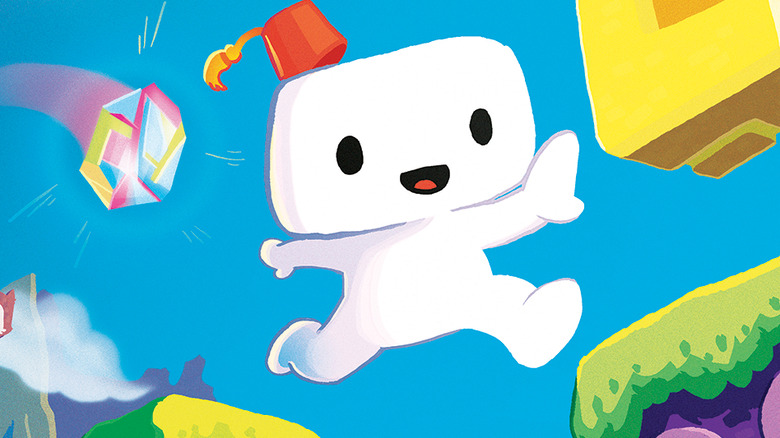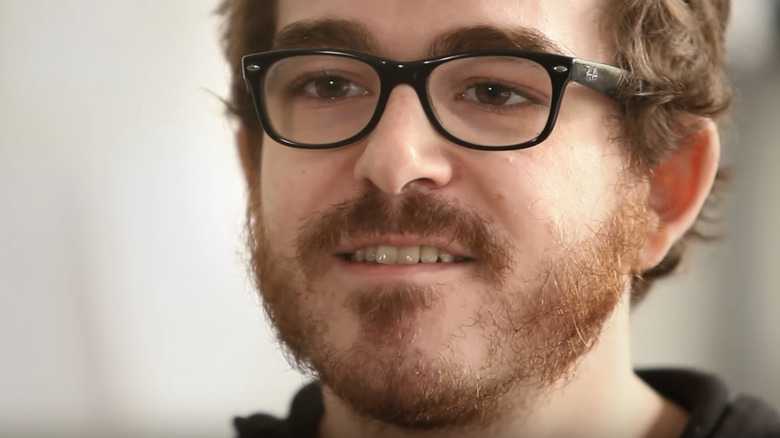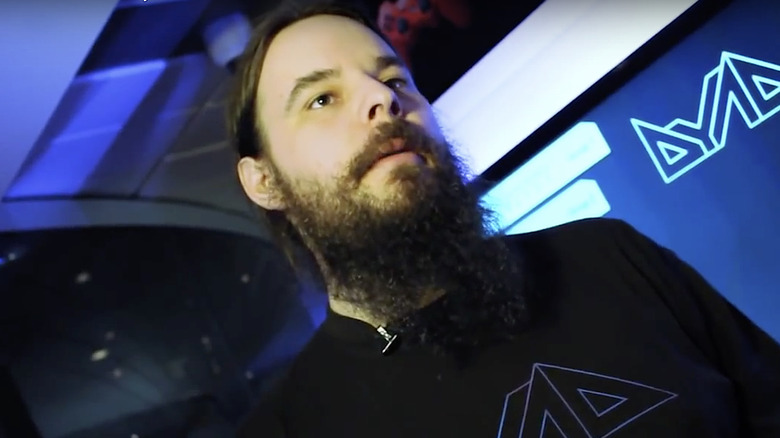Why We Never Hear From The Maker Of Fez Anymore
For a brief moment in gaming history, Polytron Corporation founder Phil "Fish" Poisson was a well-known name in indie circles. Following the success of his quirky platform puzzler Fez, the young game designer was thrust into the center of attention. Unfortunately for Fish, however, his humble indie empire would come crashing down just as quickly as he rose to fame. But what caused the one-time underdog to disappear from the public eye? Let's take a look at some of the reasons gamers don't hear so much from Phil Fish these days.
Un-Phil-tered
It's no secret that Phil Fish held strong opinions that he wasn't afraid to voice — even before Fez was released. One of his most talked-about comments came during a Q&A that followed the release of Indie Game: The Movie, a 2012 documentary that followed Fish and a number of his developer contemporaries. When asked by a Japanese freelance game programmer what Fish thought about recent Japanese games, the Fez creator responded simply, "They suck." He went on to argue that the West was " ... kicking [Japan's] ass" in the field of video games against a backdrop of laughter from both his panel and the audience.
While there's no denying that Fish was entitled to his opinion — for which he's both apologized and defended — Western and Japanese gamers, along with video game journalists, were struck by his choice of words. Kotaku's Brian Ashcraft, who'd corresponded with both Fish and the programmer who'd asked the question, noted that gamers were all but certain to interpret the game designer's words in the wrong context, as if he were "slamming the entire nation of Japan." And unfortunately, when it comes to the carefully scrutinized words of public figures like Fish, that's exactly how the internet operates.
Regardless of how the gaming world felt about his opinions — or whether or not they hold water — Fish's propensity for brutal honesty painted him in a controversial light. The April 2012 release of the critically acclaimed Fez would only serve to make him a bigger target for gaming journalists out for blood.
The Blowfish-Beer beef of 2k13
When rumors started spreading that Microsoft would allow indie developers to self-publish their games to the Xbox Live Arcade in late July 2013, journalists began scrambling for sound bites — as they often do. But when approached by numerous outlets about their opinions on the matter, prominent indie developers Phil Fish and Jonathan Blow (creator of 2008's Braid) declined to comment. They each cited a lack of credible information as their reason for refusing to weigh in. And considering that, at the time, Microsoft had yet to reveal the extent to which they would grant developers freedom to create America's next great indie gem, their response would seem appropriate.
Well, it wasn't. At least, not to GameTrailers' Marcus Beer — aka "Annoyed Gamer." In an episode of GameTrailers' panel discussion web show, Invisible Walls, Beer called out the two developers, whom he collectively named "Blowfish," for avoiding the press. He proceeded to barrage them with insults, referring to them as, among other colorful names, "f***ing hipsters" and "a**holes." Because the internet is, well, the internet, Fish didn't take kindly to Beer's attack, and he retaliated in kind, calling Beer a "f***face" and telling him to "kill [himself]." Sure — he followed these vicious tweets with a series of seemingly sincere statements about " ... how much [being attacked by Beer] hurts" and the invalidity of Beer's criticisms. But the damage was already done.
Fez II swims with the fishes
Following his micro melee with Beer, Fish unleashed another series of vitriolic tweets, opening up about his disillusionment with the game industry and announcing the cancellation of the forthcoming Fez II. The abrupt abandonment of his unreleased title was a bombshell move that surprised many gamers and journalists, with Fish's fans wondering whether or not the whole thing was a gag.
But Fish claimed, writing on the official Polytron website, it came after a "long, bloody campaign" rather than as a result of, as he put it in an earlier tweet, " ... some boorish f*** [saying] something stupid." He also stated infamously, in the same Polytron update in which he hinted at taking a leave from the industry, "i take the money and i run," suggesting he would be assuming control of the funds previously invested in the development of Fez II. It seemed as though Fish was done putting up with the abuse that came with his newfound notoriety.
The dawn of the doxx
Apparently, the internet's worst weren't finished with Fish just yet. In fact, "abuse" was only the first step in breaking the video game auteur. In August 2014, Phil Fish's personal Twitter account and Polytron's official website were hacked. Allegedly, 1.5 GB of data were stolen, with a huge number of Fez's game files — along with both his and Depression Quest developer Zoe Quinn's personal information — released to the public. The hack was allegedly perpetrated by 4chan's /v/ board as evidenced by a "signed" message left on the website. It's assumed that Quinn and Fish were targeted, in part, due to their outspoken political stances in the gaming community — the two were frequently and derogatorily labeled "SJWs," or "social justice warriors."
Skeptic and tech-savvy gamers, however, were quick to point out a number of inconsistencies related to the alleged doxxing attack. A lengthy entry posted to the now-defunct Bread Blog Tumblr noted that there was no way the supposed hackers could've collected, compressed, and released 1.5 GB of data so quickly after obtaining it, suggesting that the file that was released was ready before the attack even took place (via Crave). Other gamers familiar with 4chan's /v/ board noted discrepancies between the community's style and the message in question.
Regardless as to whether Fish's doxxing was an inside job or the work of a black hat mastermind, the attack spelled a turning point for the Polytron founder's career.
Defeat, tweet, repeat
After his private information was leaked, Fish once again took to Twitter, launching into another slew of tweets. But instead of focusing all of his rage on his alleged doxxers, Fish turned his attention to the gaming industry as a whole. And, boy, did Fish have a lot to say.
One oft-quoted tweet posted during Fish's deluge read, "i wish videogames was a building so i could burn it down with all you people in it." Another tweet, this time addressing his cyber attackers, simply read, "terrorists." In another sequence of tweets, Fish adopted a less malicious, more advisory tone, warning aspiring game developers to abandon their dreams: "give up on your dreams. they are actually nightmares."
Famous last words
But Fish had more in store for both his fans and his detractors. Topping off his Twitter tirade, the disheartened game designer went on to announce that both Polytron Corporation and the Fez intellectual property were to be sold to the highest bidder, adding that "no reasonable offer will be turned down," and lamenting, "i am done. i want out." Sadly, Fish did manage to get out — he just did so before elaborating any further on his previous statements. With one final tweet, an ominous command of "RUN AWAY," Fish deleted his Twitter account and fell silent — for a little while, at least.
Good artists borrow, great artists steal
Fish may have stepped out of the spotlight in 2014, but his name continued to find its way into gaming headlines. In early 2015, games industry insider alleged that Fish had stolen vital assets of Fez from Dyad and N++ creator Shawn McGrath prior to the pair's professional "break up."
In an interview with TechRaptor, former Destructoid writer Alistair Pinsof claimed that "Phil Fish significantly stole from [Shawn McGrath's] code, projects and ideas to create Fez" after the two developers worked together on the title. He also asserted that McGrath held certain information, like his alleged involvement in Fez prior to its 2007 GDC trailer, as "leverage" against both Fish and the filmmakers behind Indie Game: The Movie.
In an interview with Kotaku's Jason Schreier, however, McGrath recounted the events leading up to — and surrounding — Fez's inception differently. In the interview, McGrath claimed that he possessed no such "leverage" and that he and Fish hadn't even worked on Fez together. Instead, they collaborated on an early prototype of the game's 2D/3D rotation mechanic and — well, that's pretty much it. Still, McGrath admitted to being a little bummed that Fish took advantage of the gameplay element, even if he doesn't think he straight-up "stole" it like Pinsof alleged in the interview.
After all, McGrath claimed to have worked on his own dimension-swapping game for a year before getting his first glimpse of Fez. Once he saw it, McGrath recalled, he promptly gave up on the project, realizing, " ... well, I guess I just wasted a year of my life."
Don't call it a comeback
While the name "Phil Fish" may no longer inspire heated arguments like it once did, the ambitious brain behind Fez has yet to officially hang up his hat — despite promises to kick the gaming industry to the curb. In 2016, Fish and his games-as-art advocacy collective, Kokoromi, redeveloped an in-house 2008 first-person puzzler for modern-gen gaming hardware. This retro-futuristic shape-matching title would grow into the VR-based SUPERHYPERCUBE, which found a PlayStation 4 and PC release in October 2016. SUPERHYPERCUBE received mixed-to-positive reviews, with critics praising the title's addictive gameplay and immersive use of 3D space. More importantly, however, the psychedelic spatial reasoning puzzler proved that Fish could still make a damn fun game.
Picking up the pixels
Fish doesn't seem to be letting the past stop him from flexing his creative muscles — and, this time, he's not limiting his work to just video games. In December 2017, Polygon reported that the game designer had teamed up with retro gaming hardware juggernaut Analogue to create the boot-up screen for the Super Nt. For those out of the loop, the Super Nt is a high-end, contemporary reimagining of the SNES complete with 1080p HD compatibility. Fish designed 30 uniquely glitch-y, retro versions of Analogue's logo for the project, meaning gamers will be greeted by a randomized glimpse of Fish's artwork every time they boot up their console.
Fans of Phil Fish may still be holding out for a surprise announcement of Fez II — but don't hold your breath expecting that it'll ever hit digital download shelves. Still, it's comforting to know that gaming's most notorious enfante terrible hasn't given up on the medium yet.
As of January 2018, Polytron Corporation has yet to collapse, which is good news for those worried he'd actually sell his studio. And as of late December 2017, Fish himself is still playing — and talking about — games.






